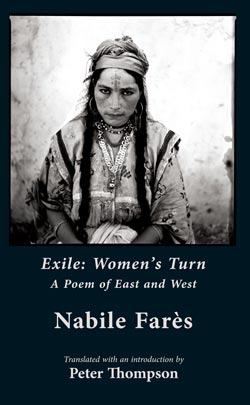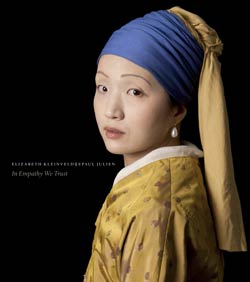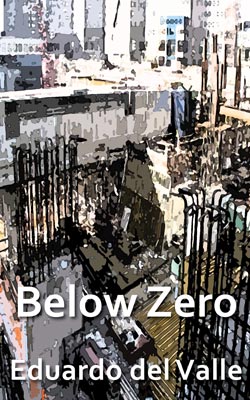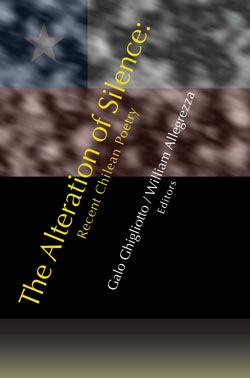Description
A Poem of East and West
(L’exil au féminin
poème d’Orient et d’Occident)
by Nabile Farès
translated by Peter Thompson
ISBN: 978-1-944884-26-0 (pbk.)
(October, 2017)
The death of Nabile Farès in August, 2016, was a great loss to Francophone North African letters. He worked closely with translator Peter Thompson over the years to see several of his works translated into English. They were working together on Exile: Women’s Turn at the time of his death, and we are proud to be able to release this work into English now.
The tri-consonantal Arabic root h.j.r. states the fact of exile in the nouns hejer/hejira, while simultaneously naming the woman Hagar, mother of Ishmael, she who personifies exile as the condition of woman in the Abrahamic cultures, where, as Nabile Farès says, she is “an illegal in language.” And it is the great merit & beauty of these poems to speak to & of (without the male arrogance of claiming to speak for) the women (of his native Algeria, & of elsewhere & not only in the Arab world) in their double exile, “these women [who] resembled / Clandestine vowels / Of the Unwanted Languages,” humbly declaring his work to be “your voyage // my translation.”
—Pierre Joris, author of h.j.r., An American Suite, Barzakh (Poems 2000-2012), Breathturn into Timestead: The Collected later Poetry of Paul Celan (2013.) and The University of California Book of North African Literature.
From the Foreword by translator Peter Thompson:
This most recent translation of Farès is the first one to follow his death (August, 2016). I had greatly looked forward to giving him the English version. He was a reader of English and an admirer of Bill Lavender’s book designs.
I had also anticipated more conversations about the theme of the book. We had finished work on the manuscript, but its central image–perilous crossings of the Mediterranean–had surged back into the news. Within these journeys beats the brave, feminist heart of this book.
Farès had explained to me, about three years ago, that this poetry arose from a special moment in African migration and exile. Men, before the 1980s, had always been the ones to leave North Africa in search of work (mainly in France and Spain). They found dubious lodging–often in exploitive dormitories–and sent money home. That changed when women, in a considerable wave, undertook the sea crossing on their own. Exile: Women’s Turn is that journey, and that sea change in women’s destinies.
When images were too obscure for my confident rendering, I found–as I always have–that Farès’s view of poetic image was really an enjoyment of constant mutation. He looked at problems I presented as if he had never seen the image before, and immediately started embellishing and extending his earlier version. As much fun as this was, it left me thinking that the English was indeed an extension of his thought, and that I had considerable freedom (I didn’t abuse it) in making his poetry intelligible in the new form. That said, the real value of his modest yet exuberant exploration of his own earlier text was how he enacted poetry’s deepest genius: the frustrating but exhilarating inability to rest, to be one version–inert, defined, completed.
Women, Africa, even the process of exile–all these are protagonists in Farès’s imagination. Algeria is an element that unites them. Referring to my earlier interview (Crisolenguas, 2008), I asked (2011) “Are you saying that Algeria will always be a protagonist in your work?”
“Yes, so long as Algeria and above all what Algerian men and women are living is a part of humanity, and as long as this preoccupation doesn’t exclude the world’s other peoples, such as they appear in Le Miroir de Cordoue, L’Etat perdu (untranslated), and Exile: Women’s Turn. L’Etat perdu is a book about the rights to life and residence of so-called immigrants, and which talks about the relation between the ideal of rights for people, women, children, men, old people, and what these people actually live through, today, in the contexts of political crises, military, national and international crises. I think it’s because these books touch on questions that are so dense and important to each one of us that little is said about them–as if a writer, like me, could have come from the ends of the world and a place that doesn’t exist and wouldn’t be recognized in his work. And above all because these are formulations that are not denunciations but warnings of much more serious troubles to come… which I probably owe, in some way, to my work as a writer and a psychoanalyst….”
Translation became a new protagonist for Farès, or at least a new agent in his process. Etymologically, translation “carries” this book somewhere, just as poetry carried the exile, and exile carried these women. And in his process, in his responses to queries (as above), Farès must have seen how his text of thirty years ago is carried forward, how he and I were creating a problematic return to it; translation was creating a distance, a separation, a new exile or an extension of exile. His generosity allowed this to be a positive transformation.
About the Front Cover
Special thanks to Marc Garanger for donating the cover photograph, included in his well-known collection, Femmes Algériennes 1960.
In 1960, as the Algerian war was drawing to a close and imprisoned Algerians were being released and resettled, the French government decreed that all of them should be given French-style ID cards, so that their movements could be tracked. Garanger, a French army conscriptee with experience in photography, was given the task of photographing more than a thousand women for this purpose. These women, most of whom had never had their faces uncovered outside of their homes, were stripped of their veils and forced to sit for the photos in front of an audience of soldiers. Their reactions to this treatment, and indeed to the whole brutal history of colonialism, can be read on their faces. Read more about Garanger’s collection here.







Reviews
There are no reviews yet.